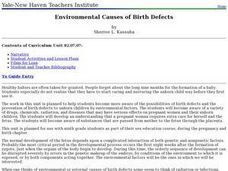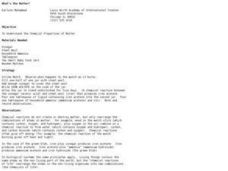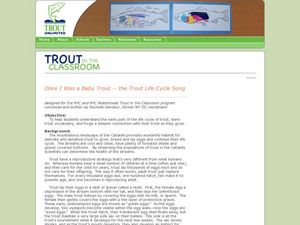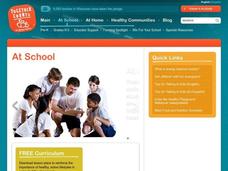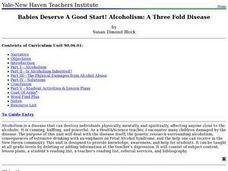Curated OER
Babies
Young children are fascinated by babies! Here is a simple idea which allows your pupils to perform a role-play based on taking care of a baby. They feed, change, sing to, and hold their pretend babies. Children listen to lullabies from...
Curated OER
Eighteen Ways to Make a Baby
Students view a video clip about post-menopausal women having children. They identify the ethical, legal and social implications of this. They also read a case study.
Curated OER
Taking Care of a Baby
Caring for a newborn is harder than it looks! Elementary pupils learn more about taking care of babies with an age-appropriate lesson that addresses how babies grow inside their mothers, what they need to grow, and how members of the...
Curated OER
My Owl Babies Miss Momma
Students investigate the relationship between children and parents by reading a book about owls. In this story analysis lesson, students read the book Owl Babies and participate in a role play based on one of the characters. Students...
Curated OER
Moms and Babies
Students identify the developmental stages of babies. In this adult health lesson plan, students arrange given foods in order of which they would start giving their children first. They discuss ways to take care of their health and well...
Curated OER
Taking Care of a Baby
Pupils are introduced to the basics of human development and the critical role of parents in taking care of a newborn.
Curated OER
Language Acquisition: How Babies Learn a Language
Students create a book for small children. In this literary lesson, students examine the qualities in children's literature that capture the attention of the child. They then work in small groups to create a book to share with younger...
Curated OER
Help the Duck Find Her Babies
Students are introduced to a basic characteristic and need of living things-the ability and need to reproduce. They investigate how birds (and people) attract mates. Students discover how to build a nest. They discuss the needs and...
Curated OER
Making Babies
Students participate in a genetics activity in which they determine genotypes and phenotypes for given traits. They work with a partner and create babies based on their genotypes. Once traits for babies are determined, they write...
Curated OER
Disney's Animal World Part 2: That's My Baby
Students see that baby animals go through different stages of growth during their life, just as people do. They use the downloadable Cyberlesson Worksheet to reinforce what they have learned about animals and their offspring.
Personal Genetics Education Project
Genetics and Reproduction
Disease prevention or designer babies? Use a set of slides to introduce the growing practice of preimplantation genetic diagnosis, or PGD. Teens read related articles and then break into groups to address different scenarios. Afterward,...
Curated OER
Environmental Causes of Birth Defects
Get your high schoolers thinking about the factors that lead to birth defects. They examine how environmental factors and personal choices can cause birth defects in unborn children. They discover the effects of various handicaps such as...
Serendip
Soap Opera Genetics – Genetics to Resolve Family Arguments
Did she cheat on her husband? Did the hospital switch the babies? Should they have children? As much as this sounds like the plot for a soap opera, all of these questions fit into a single lesson on genetics. Scholars read about three...
Curated OER
What's the Matter? (Living and Non-Living Things)
Understand how chemical reactions recombine atoms to create the "chemicals of life". An experiment, showing the basic chemical reactions of an iron nail or a match, helps young children start their understanding of permanent changes.
Curated OER
How Can You Predict the Characteristics of an Unborn Baby?
Students compare three sets of unlabeled human chromosomes and gather related data, trace chromosomes to pair them, and make observations about them.
Curated OER
Designing Babies
Students analyze current and emerging techniques used to select specific characteristics in offspring. They examine specific case studies and make ethical decisions based upon the Ethical Decision-Making Model.
Curated OER
Help the Duck Find Her Babies
Students study the basic need for animals to attract mates and reproduce young.
Curated OER
Taking Care of a Baby
Students explore the basics of human development and the critical role of parents in taking care of a newborn.
Curated OER
Once I Was a Baby Trout
Students sing a song about the trout life cycle. In this trout life cycle lesson plan, students learn trout vocabulary and make motions while singing this song.
Curated OER
Mothers' Milk-Unleaded, Please
Lead toxicity is a hot topic these days, especially when it was a common component in household paint for many years. In Taiwan, there was concern that babies were being exposed to toxic levels of lead through breast milk. A study was...
Curated OER
Energy Plus!
This instructional activity seems pretty advanced for K-2nd graders, but there are some pieces that can be used with young learners. Look through this comprehensive, fact-filled instructional activity and pull out information and...
Curated OER
Farm Animals - Mothers and Babies - "Are You My Baby?"
Students listen to a teacher read aloud and discuss the farm animals. They participate in an role playing activity that explains how mother mammals recognize their young by their scent.
Curated OER
Making Babies
Sixth graders complete a human traits survey. In this genetics lesson plan students read articles and fill out a worksheet on genotype and phenotypes.
Curated OER
Babies Deserve A Good Start! Alcoholism: A Three Fold Disease
Students study the basic disease concept of alcoholism. The determine that alcoholism is progressive and explore the levels of progression. They name the three factors contributing to the cause of alcoholism and explain each one with...













